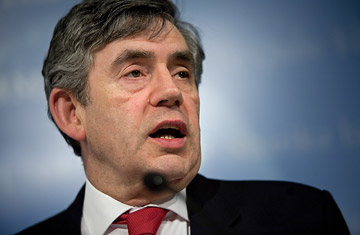
Gordon Brown (shown here in April 2007) has decided not to call a snap election.
The failure to act may carry consequences that are just as weighty as decisive action. Ask Hamlet. Gordon Brown, like the Prince of Denmark, has been paralyzed with indecision over whether to continue governing without a fresh mandate until his term of office expires in 2010 or go to polls to secure a fresh five-year term. (He took over as Britain's Prime Minister from Tony Blair in June without an election.) Most Britons thought they knew what Brown would decide. After all, the Labour party had for years been substantially ahead of its nearest rivals, the Conservatives, in opinion polls. Another compelling reason for a snap election: economic turbulence, and projections of damage to the U.K. economy, that may soon erode Labour's popularity.
So Britain has been on high alert. Party chiefs had already drawn up detailed campaign plans and taken on extra staff to carry these out. Donors were tapped for extra funds. Politicians pounded the streets peddling their policies as their constituents mulled over the options. All that remained was for Brown to summon an official limo to take the short drive from Downing Street to Buckingham Palace where he would ask the Queen to dissolve parliament. He was expected to do so on Oct. 9 to set up an election for Nov. 1.
There may be a Nov. 1 election, but not this year or even in 2008, according to Brown. In an Oct. 6 interview with the BBC, the Prime Minister ruled out a fall poll, adding "I think it's very unlikely that [an election] will happen in the next period. I think the important thing is that we get on with the business of change in this country because people do want change and I'm responding to that demand."
In the days leading up to Brown's surprise announcement, polls had indeed hinted that British voters might want change — from Labour to the Tories. A survey of marginal constituencies conducted by the U.K.'s largest Sunday tabloid, the News of the World, for publication on Oct. 7, showed the Conservatives leading by 6% in the contests for these key parliamentary seats. Earlier polls showed the parties neck-and-neck.
Most psephologists believe that Labour would have won an overall majority if Brown had called a November election. That's a belief shared by the Tories, who are convinced that a later election will benefit their cause. They expect the British economy to stutter, damaging Labour's reputation and, more especially, Brown's — he was Chancellor of the Exchequer for 10 years before becoming Prime Minister, after all. They also want months rather than weeks to woo electors with vote-winning policies such as their planned changes to the inheritance tax, which would raise the threshold to 1 million pounds from the current level of 300,000 pounds. At their annual conference in Blackpool, which concluded on Oct. 4 with a bravura speech by Conservative leader David Cameron, party strategists played a careful game: they pretended to relish the prospect of an election, but were actually seeking to boost their party's popularity to scare Brown off an early election.
They succeeded. Brown blinked, and now many of his own party are braced against a backlash. "He'll look weak, indecisive," said a party insider. "It's a question of character."
Older Labour members also shudder, remembering one of the darkest hours in their party history. In 1976, when Harold Wilson resigned as Prime Minister, James Callaghan took his place. Two years later, ahead in the polls and apparently with every prospect of winning his own mandate, Callaghan unexpectedly shied away from calling elections. Early in 1979, he lost a confidence motion and was forced to go to the country. His opponent, Margaret Thatcher, led her Tory party to victory and to an unbroken 18 years in office.
